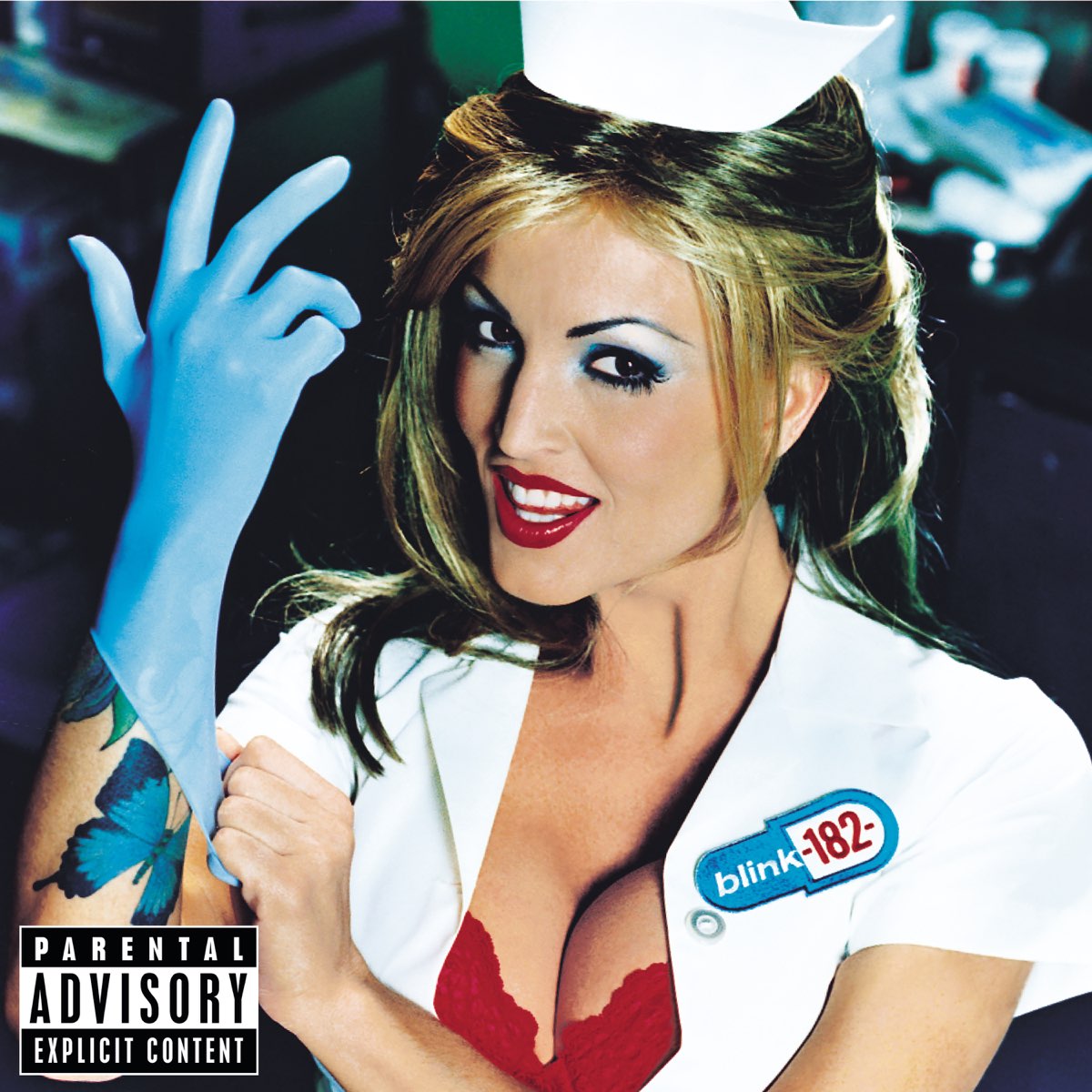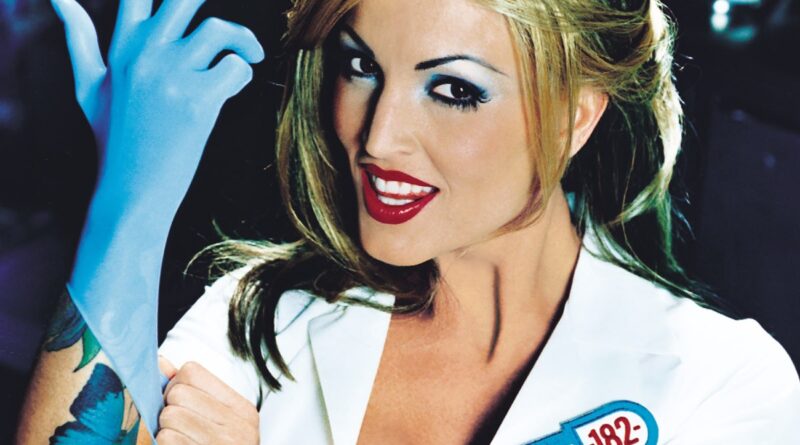HEAVY MUSIC HISTORY: Enema Of The State – Blink-182
As covered recently enough here in Heavy Music History, Dookie (1994) by GREEN DAY really was one of the most game-changing records of the 1990s. Where pop-punk had previously taken various disparate forms in the hands of bands like the BUZZCOCKS, DESCENDENTS and even the RAMONES, it was at this point that it became something concrete and – perhaps more importantly – bankable. To borrow a term from the strapline of Dan Ozzi’s fantastic Sellout (2021), it followed NIRVANA’s Nevermind (1991) in setting off a ‘major label feeding frenzy’ that continued well into the subsequent decade, accompanied of course by considerable pushback from those within the punk and DIY communities who felt such interests were antithetical to their ethos.
True to the metaphor, many bands were indeed chewed up and spat out during this period, often buckling under increased pressure or finding themselves of lower priority than expected when they signed on the dotted line, all while contending with varying levels of ostracisation in the scenes they called home. In some cases – like that of JAWBREAKER – crowds would literally turn their backs on the band when they played their major label material live, and there were scarcely any who weren’t forced to duck the occasional hurled milkshake or tirade of abuse in the influential pages of Maximum Rocknroll.
But BLINK-182 were never fazed by any of this. As bassist/vocalist Mark Hoppus explained to Ozzi in the aforementioned Sellout: “I’d say ‘I want my music on the radio. I love our band and I want everybody to hear us. I want everybody to come to the party.’” And – to get to the point here – no-one has ever thrown a party quite like Enema Of The State.
Of course, Enema was actually BLINK’s second go at the major label rodeo, and things had worked out pretty well the first time around. 1997’s MCA-backed Dude Ranch sold over 500,000 copies in the US in its first year alone, this thanks in no small part to its iconic lead single Dammit and accompanying MTV staple of a music video, not to mention the band becoming one of the most talked-about acts on the legendary Vans Warped Tour in the summer of the album’s release. It turned the trio of Hoppus, guitarist/vocalist Tom DeLonge and then-drummer Scott Raynor into superstars, which, after all, was all they’d ever wanted.
Or at least, all two of them had ever wanted. Raynor was already displeased that the band had chosen to sign with MCA instead of Brett Gurewitz’s Epitaph Records, and he was eventually asked to leave as tensions grew over his relationship with alcohol. Some versions of the story suggest that he had actually agreed to quit drinking and go to rehab before he was fired, but either way Raynor has since expressed that he holds no ill will towards his former bandmates, and with the benefit of hindsight it is impossible to argue that the episode was not a blessing in disguise.
Having already recruited the heavily tattooed drummer of their ska-punk tourmates THE AQUABATS to fill in on a few dates Raynor was forced to miss due to personal issues, DeLonge and Hoppus soon realised they’d found the final piece in the BLINK-182 puzzle. Travis Barker joined the band full-time from the summer of 1998 as they embarked on a three-month headlining run through North America gleefully dubbed the PooPoo PeePee Tour; the rest, as they say, is history.
With their soon-to-be definitive line-up complete, BLINK’s sound became instantly more dynamic and diverse. Surely the most technically-gifted drummer the world of pop-punk has ever seen, Barker could do more than just play fast – though tracks like The Party Song and Anthem would demonstrate that he could do that too – his background in marching bands and jazz ensembles and love of everything from hip-hop to the work of Stewart Copeland of THE POLICE all shaping a far more characterful style than that of any of his contemporaries. Barker’s drumming opened up new possibilities for BLINK-182, inspiring DeLonge and Hoppus to push themselves as musicians and in turn becoming one of the band’s most defining features alongside the frontmen’s vocal interplay.
Barker’s recruitment wasn’t the only personnel change that affected Enema either; also brought in was producer Jerry Finn, his work on the aforementioned Dookie and RANCID’s …And Out Come The Wolves (1995) having made him the number one choice for any punk band looking to write and record songs you might hear on the radio. Finn polished up BLINK’s sound significantly, putting the pop in pop-punk on a level that would soon become even more imitated than the blueprint he had established with GREEN DAY just five years previously. It was also Finn who suggested the band recruit keyboardist Roger Joseph Manning Jr., this adding an extra sheen to the already gigantic likes of All The Small Things, Wendy Clear and the aforementioned Anthem among others.
Speaking of All The Small Things, in that and lead single What’s My Age Again? before it Enema had not one but two aces up its sleeve – tracks that would surpass even Dammit in terms of commercial success – each accompanied by videos which would embed images of the band frolicking on the beach and chasing porn and album cover star Janine Lindemulder down the street into the minds of an entire generation. Both crossed over to pop radio, the former peaking at number six on the Billboard Hot 100 and the latter becoming the go-to reference for just about every birthday cake and social media post whenever anyone in Vans turns 23.
Enema’s third single – Adam’s Song – was equally impactful, albeit for different reasons. Written by Hoppus as he wrestled with loneliness and depression on tour, the track was strikingly sincere on an album generally more concerned with girls and relationships, and especially from a band who had essentially made their entire name on dick jokes and self-deprecation. Suddenly Hoppus was singing about dying alone and being “too depressed to go on”, albeit with a hopeful turn at the end via a stunning final chorus in which its lonely narrator looks ahead to better days. It became an anti-suicide anthem, laying the groundwork for further sincerity in tracks like Stay Together For The Kids on Enema’s 2001 follow-up Take Off Your Pants And Jacket, and indeed even more so on 2003’s Untitled and all that came after it.
But as big – and often as good – as a lot of that material was, Enema remains inarguably BLINK-182’s finest and most defining hour. Seventh months after the album’s release the band would usher in the new millennium by performing its two biggest hits live from Times Square for MTV’s New Year’s Eve Party – fitting in that at this point they had set the benchmark and standard for pop-punk in the 21st Century. Dookie was fantastic and essential, and it’s impossible to argue with anyone who has it at number one on their ‘best pop-punk albums of all time’ list, but when it comes to what pop-punk actually sounds like now, what people hear in their heads when they think of it, no album deserves more credit than Enema Of The State.

Enema Of The State was originally released on June 1st, 1999 via MCA Records.
Like BLINK-182 on Facebook.

